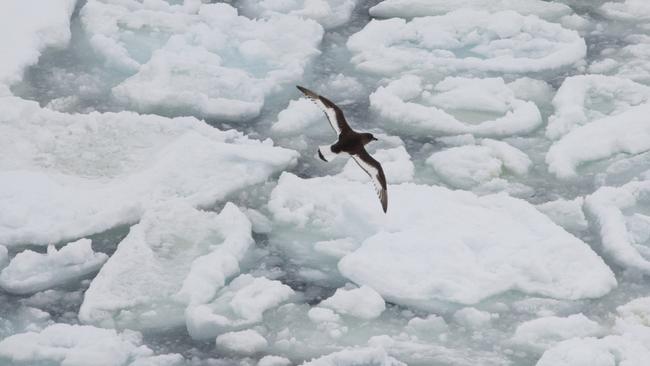Stranger from a frozen land
In south-west Victoria recently, a small, bright wonder: a huddled bird all the way from Antarctica. Alive, and alone.

In south-west Victoria recently, a small, bright wonder. A huddled bird all the way from Antarctica. Alive, and alone. The beautiful little Antarctic petrel was found on one of Portland’s Bridgewater Lakes, a series of sheltered coastal lagoons. The species is one of the most southerly nesting birds in the world – so this little trouper was a long way from home.
The lone pageantry of its life. The poetry in its courage to be here, among us. When did it rest, with the sea as its only constant for such long stretches of flight time? Did the winds of the Roaring Forties buffet and tumble it and blow it off course? There’s something so moving about the bird’s epic journey into the unknown.
An Antarctic petrel’s favoured world is frozen white – they’re found near ice floes, pack ice and icebergs. The wonder of green this bird must have seen below it, the wonder of all the surprising new colours. Because it came from the land of resolutely no green, with a strict polar palette of white and blue, grey and brown and black.
Petrels feed on krill, squid and fish and do most of their feeding while swimming or diving. They produce a foul-smelling stomach oil that can be used to feed their young via regurgitation, or to spray at predators, or to sustain themselves on long flights; perhaps it sustained this one on its journey to an unknown north. The word “petrel” is a reference to St Peter, who walked on water; petrels run on water as they take off.
They’re social birds that nest in densely packed colonies. In the off-breeding season they can be found in flocks of thousands on icebergs – a mass gathering, like a crammed music festival, of hormones and sexual tension, of greetings and flirtations and demands and disputes. There are more females than males, so each season some of the girls are unable to mate. Was this little one a female searching for an elusive male somewhere else, crazed by baby-want? Alas, we do not know the sex of our brave hermit of the air. Our plucky outlier.
Traditionally we cast aspersions on those from other places; they’re unwanted, disparaged, shunned. But the courage it takes to be here, the moving beauty in the resolve. The term “vagrant” is used in biology to denote an individual that strays far outside its normal range. It can be the result of environmental changes, or simply chance. This Antarctic petrel is an extreme example. A happy accident. A mistake.
Its presence in Victoria might be huge, or completely insignificant. Birdline Victoria, which reports sightings of rare or unusual birds outside their range, states this is perhaps only the second live recording of this species on the Australian mainland. It was found and photographed recently by sightseers, who then reported it. Whatever else, I hope it’s still alive.
Imagine, after spending your life surrounded by kin, to finally arrive at the severe austerity of this loneliness. Or was it a release? Did our petrel set out on its path deliberately, or was it pushed from its colony, or blown on high winds, tumbled and tossed and then righted? Was it arrowed to new worlds, like a feathered Elon Musk?
Our Antarctic petrel vanished after being photographed; no one knows where. It might have been taken by a predator or it might have died from its gruelling journey. Its presence, briefly among us, feels like a lovely miracle.
I’ve always been on the side of the disruptors, those who go against the flock. It takes courage to strike out alone. To be different. This little one is a solitary disruptor, but for what gain? Our wonder at least. Joy is the thing with feathers.




To join the conversation, please log in. Don't have an account? Register
Join the conversation, you are commenting as Logout